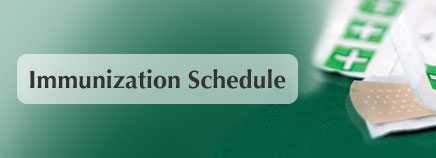
This schedule of recommended immunizations may vary depending upon where you live, your child’s health, the type of vaccine, and the vaccines available.
Some of the vaccines may be given as part of a combination vaccine so that a child gets fewer shots. Talk with your doctor about which vaccines your kids should receive.
Birth
- HepB: Hepatitis B vaccine; ideally, the first dose is given at birth, but kids not previously immunized can get it at any age.
1–2 months
- HepB: Second dose should be administered 1 to 2 months after the first dose.
2 months
- DTaP: Diphtheria, tetanus, and acellular pertussis vaccine
- Hib: Haemophilus influenzae type b vaccine
- IPV: Inactivated poliovirus vaccine
- PCV: Pneumococcal conjugate vaccine
- RV: Rotavirus vaccine
4 months
- DTaP
- Hib
- IPV
- PCV
- RV
6 months
- DTaP
- Hib: This third dose may be needed, depending on the brand of vaccine used in previous Hib immunizations.
- PCV
- RV: This third dose may be needed, depending on the brand of vaccine used in previous RV immunizations.
6 months and annually
- Influenza (Flu): The flu vaccine is recommended every year for children 6 months and older:
- Kids younger than 9 who get the flu vaccine for the first time (or who have only had one dose before July 2016) will get it in two separate doses at least a month apart.
- Those younger than 9 who have had at least two doses of flu vaccine previously (in the same or different seasons) will only need one dose.
- Kids older than 9 only need one dose.
- The vaccine is given by injection with a needle (the flu shot). The nasal spray form that was available in the past is not currently recommended because it was not found to be effective enough in recent years.
6–18 months
- HepB
- IPV
12–15 months
- Hib
- MMR: Measles, mumps, and rubella (German measles) vaccine
- PCV
- Chickenpox (varicella)
12–23 months
- HepA: Hepatitis A vaccine; given as two shots at least 6 months apart
15–18 months
- DTaP
4–6 years
- DTaP
- MMR
- IPV
- Varicella
11–12 years
- HPV: Human papillomavirus vaccine, given in two shots over a 6- to 12-month period. It can be given as early as age 9. For teens and young adults ages 15–26, it is given in three shots over 6 months. It’s recommended for both girls and boys to prevent genital warts and certain types of cancer.
- Tdap: Tetanus, diphtheria, and pertussis booster. Also recommended during each pregnancy a woman has.
- Meningococcal conjugate vaccine: And a booster dose is recommended at age 16.
16–18 years
- Meningococcal B vaccine (MenB): The MenB vaccine may be given to kids and teens in two or three doses, depending on the brand. Unlike the meningococcal conjugate vaccine, which is recommended, the MenB vaccine is given at the discretion of the doctor.
Special circumstances
- HepA is also recommended for kids 2 years and older and adults who are at high risk for the disease. This includes people who live in, travel to, or adopt children from locations with high rates of hepatitis A; people with clotting disorders; and people with chronic liver disease. The vaccine also can be given to anyone who desires immunity to the disease, and is useful for staff at childcare facilities or schools where they may be at risk of exposure.
- The MMR vaccine can be given to babies as young as 6 months old if they will be traveling internationally. These children should still be given the recommended routine doses at 12–15 months and 4–6 years of age.
- The flu vaccine is especially important for kids who are at risk for health problems from the flu. High-risk groups include, but aren’t limited to, kids younger than 5 years old and those with chronic medical conditions, such as asthma, heart problems, sickle cell disease, diabetes, or HIV.
- The meningococcal vaccines can be given to kids as young as 6 weeks old (depending on the type of vaccine) who are at risk of getting a meningococcal infection, such as meningitis. This includes children with certain immune disorders. Kids who live in (or will be traveling to) countries where meningitis is common, or where there is an outbreak, should also receive a vaccine.
- Pneumococcal vaccines also can be given to older kids (age 2 and up) who have conditions that affect their immune systems, such as asplenia or HIV infection, or other conditions, like a cochlear implant, chronic heart disease or chronic lung disease.
Reviewed by: Elana Pearl Ben-Joseph, MD
Date reviewed: February 2017

